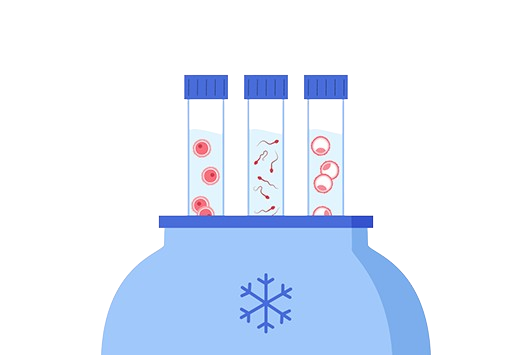Egg Freezing
What is Egg Freezing?
Egg freezing is one of the most advanced techniques available to preserve a woman’s ability to conceive in the future. It involves retrieving a woman’s eggs and freezing them under highly controlled laboratory conditions for later use.
When needed, the frozen eggs are thawed, fertilized with sperm in the laboratory, and the resulting embryos are transferred to the woman’s uterus through IVF.

Since the egg is the largest cell in the human body and contains a significant amount of water, freezing it can pose challenges due to ice crystal formation, which may damage its structure. To prevent this, special cryopreservation techniques are used, involving cryoprotectants such as propanediol and sucrose to protect the eggs during freezing.
Why Consider Egg Freezing?
Egg freezing is an excellent option for women who are not ready to conceive but wish to ensure they can have children in the future.
Some common scenarios include:
- Health Conditions: Women diagnosed with conditions that may impact fertility, such as sickle cell anemia or autoimmune diseases like lupus.
- Cancer Treatments: Chemotherapy or radiation therapy can adversely affect fertility, making egg freezing an essential consideration before starting such treatments.
- Other Personal Reasons: Women who wish to delay childbirth for personal or professional reasons.

The Egg Freezing Process

Initial consultation &Ferility
The process begins with an initial consultation with a fertility specialist, during which a comprehensive evaluation of the woman’s fertility is conducted. This includes hormonal tests to assess ovarian reserve and an ultrasound examination to evaluate the health and functionality of the ovaries.

Ovarian Stimulation and Monitoring
The next step involves starting ovarian stimulation medications to encourage the production of multiple eggs. Throughout this process, regular monitoring is conducted using ultrasounds and hormone level checks to track follicle growth and ensure optimal egg development. If needed, medication dosages are adjusted to achieve the best possible results..

Trigger Shot and Preparation for Egg Retrieval
A trigger shot is administered to induce the final maturation of the eggs, ensuring they are ready for retrieval. The egg retrieval procedure is typically scheduled 36 hours after the trigger shot, allowing optimal timing for successful collection.

Egg Retrieval Procedure
The egg retrieval process is a minor surgical procedure performed under sedation or anesthesia to ensure patient comfort. A thin needle is carefully guided through the vaginal wall to extract mature eggs from the ovarian follicles. Once collected, the eggs are immediately transferred to the laboratory for thorough evaluation and preparation for fertilization.

Fertilization, Selection, and Vitrification
The retrieved eggs are fertilized in the laboratory using either intracytoplasmic sperm injection (ICSI) or traditional insemination techniques. Once fertilized, the embryos are closely monitored to ensure normal development. Healthy and viable embryos are then selected for freezing through vitrification, a rapid freezing method designed to minimize ice crystal formation and preserve the embryos for future use.

Storage and Ongoing Monitoring of Frozen Eggs
Frozen eggs are carefully stored in specialized tanks maintained at ultra-low temperatures to preserve their viability. Storage conditions are routinely monitored to ensure optimal preservation and maintain the quality of the eggs for future use.
Frequently Asked Questions FAQ
How Does Egg Freezing Differ from Embryo Freezing?
The primary difference lies in the stage of fertilization. Egg freezing involves preserving unfertilized eggs and does not require sperm, whereas embryo freezing occurs after fertilization, necessitating the availability of sperm.
When Can Frozen Eggs Be Used?
Frozen eggs can be thawed, fertilized with sperm, and implanted into the uterus when the woman decides to conceive. Eggs can remain frozen for several years, depending on the individual’s circumstances and medical recommendations.
Success Rates of Egg Freezing?
The likelihood of achieving pregnancy with frozen eggs is generally lower than with fresh eggs used in IVF. Success rates are significantly influenced by the woman’s age at the time of egg freezing. Younger eggs are typically of higher quality, increasing the chances of successful fertilization and pregnancy.
If fertilization is successful, pregnancy risks and complications are closely
